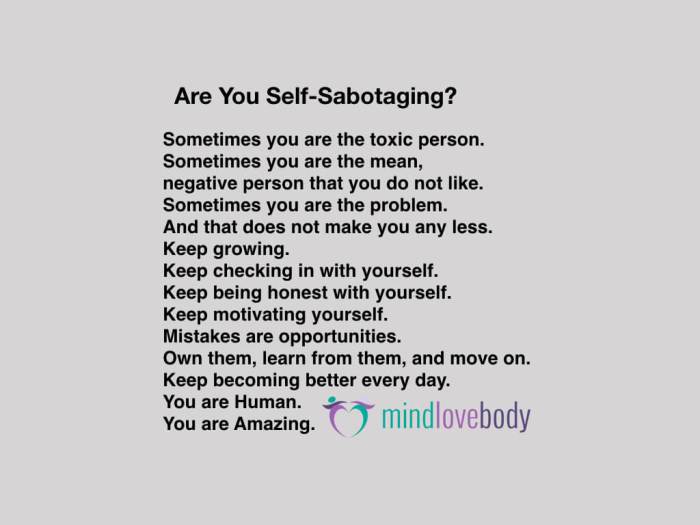Scripts are always self-sabotaging and need to be changed. This is a bold statement that captures the essence of this article, which delves into the pervasive issue of self-sabotaging scripts and explores effective techniques for overcoming them. By examining the underlying patterns, negative consequences, and strategies for change, we aim to empower individuals to break free from self-limiting beliefs and create empowering scripts that foster personal growth and fulfillment.
Self-sabotaging scripts are deeply ingrained patterns of thinking and behavior that undermine our goals and aspirations. They can manifest in various areas of life, from relationships and careers to overall well-being. Understanding the common characteristics, underlying beliefs, and motivations behind these scripts is crucial for developing effective strategies for change.
Patterns of Self-Sabotaging Scripts: Scripts Are Always Self-sabotaging And Need To Be Changed

Self-sabotaging scripts are ingrained patterns of thinking and behavior that lead individuals to undermine their own success and well-being. These scripts often stem from negative beliefs and past experiences that shape an individual’s perception of themselves and the world.
Common characteristics of self-sabotaging scripts include:
- Negative self-talk
- Catastrophic thinking
- Fear of failure
- Procrastination
- Self-destructive behaviors
Self-sabotaging scripts can manifest in various areas of life, including:
- Relationships
- Career
- Finances
- Health
- Personal growth
The underlying beliefs and motivations that drive these scripts often include:
- Low self-esteem
- Fear of abandonment
- Need for control
- Perfectionism
- Negative core beliefs
Impact of Self-Sabotaging Scripts
Self-sabotaging scripts have detrimental consequences on individuals, impacting various aspects of their lives:
- Relationships:Difficulty forming and maintaining healthy relationships due to trust issues, fear of intimacy, and self-destructive behaviors.
- Career:Underachieving, procrastination, and self-limiting beliefs that hinder career advancement.
- Finances:Poor financial decisions, overspending, and difficulty managing money.
- Health:Engaging in unhealthy behaviors such as substance abuse, poor diet, and lack of exercise.
- Personal growth:Stagnation in personal development, self-doubt, and fear of taking risks.
The psychological and emotional toll of these scripts can be significant, leading to:
- Depression
- Anxiety
- Low self-esteem
- Guilt and shame
- Difficulty regulating emotions
Techniques for Changing Self-Sabotaging Scripts

| Technique | Description | Examples |
|---|---|---|
| Cognitive Behavioral Therapy (CBT) | Identifying and challenging negative thoughts and beliefs, and developing healthier coping mechanisms. | – Thought challenging exercises
|
| Mindfulness | Paying attention to the present moment without judgment, increasing self-awareness and reducing reactivity. | – Meditation
|
| Journaling | Writing down thoughts and feelings to gain insight, process emotions, and track progress. | – Daily journaling
|
Overcoming Resistance to Change

Changing self-sabotaging scripts can be challenging due to various barriers:
- Fear of the unknown
- Low self-efficacy
- Cognitive dissonance
- Lack of support
- Resistance to change
Strategies for overcoming resistance include:
- Building self-awareness through journaling, reflection, and feedback.
- Seeking support from therapists, coaches, or support groups.
- Practicing self-compassion and forgiveness to reduce self-criticism.
- Setting realistic goals and celebrating progress to build confidence.
- Focusing on the benefits of change and the negative consequences of maintaining self-sabotaging scripts.
Creating New Empowering Scripts
| Self-Sabotaging Script | Empowering Script | Benefits |
|---|---|---|
| “I’m not good enough.” | “I am worthy of love and respect.” | Increased self-esteem, reduced self-criticism |
| “I’m going to fail.” | “I can handle challenges and learn from mistakes.” | Reduced fear of failure, increased resilience |
| “I don’t deserve happiness.” | “I deserve to be happy and fulfilled.” | Improved well-being, reduced feelings of guilt and shame |
Empowering scripts provide individuals with a positive and growth-oriented mindset, enabling them to:
- Challenge negative thoughts and beliefs
- Increase self-confidence and self-esteem
- Take risks and pursue personal goals
- Cope with setbacks and adversity
- Live a more fulfilling and meaningful life
User Queries
What are the common characteristics of self-sabotaging scripts?
Self-sabotaging scripts often involve negative self-talk, self-doubt, and a tendency to focus on limitations and obstacles.
How can mindfulness help in changing self-sabotaging scripts?
Mindfulness practices promote present-moment awareness, allowing individuals to observe their thoughts and behaviors without judgment, fostering self-awareness and the ability to challenge negative scripts.